Greetings!
So sorry that this post is totally overdue, but my computer finally died the death after a prolonged attack by Trojans and the great guys at the Ethical Computer Company were busy salvaging what they could. Thankfully, they managed to save virtually everything and so UTM is still here and still able to post his musings, which includes this next installment of ‘Across Asia With A Lowlander’, an account which details perhaps the highlight of the entire trip, when we were invited to stay in a traditional Uzbeki home by a traditional Uzbeki family. Awesome stuff.
As for future updates, they should be on time but as I’m off to Poland next week, one can never guarantee these things. However, visitors to this site will, as always, be the first to know!
Keep travelling!
Uncle Travelling Matt
Links to all parts of the travelogue
Book 1: Embarking Upon A New Korea
1e: Seoul, Incheon and Across the Yellow Sea
Book 2: Master Potter does Fine China
Book 3: Steppe to the Left, Steppe to the Right…
19th August, 2002 – Samarkand, Uzbekistan
That night I dreamt that I was in a train rumbling across Siberia, with the Lowlander who was talking in Russian to the two gentlemen whom we were sharing our compartment with. The gradual process of awakening proved this to be true, except that we were in Turkmenistan, not Siberia, and that although our two travelling companions were talking to the Lowlander in Russian, he was not reciprocating in that tongue, largely due to the fact that he does not speak it.
Turkmenistan! Oh! Turkmenistan! What a place! Or at least that’s what I’d heard during my student days when our lecturer, the estimable Dr. Melvin, an expert on Central Asia, had described the republic. If the region as a whole was weird, then this place was the Wonderland that Alice so adored. It was the land that time, progress and the world at large had clean forgotten about.
Ever since the dissolution of the Soviet Union, as in all the other ‘Stans’, the former Soviet Commissar had become the ‘democratically elected’ President indefinitely. And in Turkmenistan, that man was Saparmurat Niyazov, brought up in an orphanage and with more than an inflated sense of self. Soon after independence he declared himself to be ‘Turkmenbashi’, (Leader of all Turkmens), and so started a personality cult that would make even Uncle Joe Stalin cringe. Now the days of the week, the months of the year, half the cities and all of the vodka are named after this remarkable man who has ‘freed Turkmenistan from Soviet oppression.’ And it doesn’t stop there. The schools teach only the books that he has written and the nation’s favourite soap, which concerns an American family who move to Turkmenistan on business and stay because it is paradise on earth is titled Tukmenbashi, My Hero. Naturally, this was a place that I wanted to visit, if only to view his piece de la resistance in the centre of Ashqabat, the capital.
And that is the seventy-five metres high ‘Arch of Neutrality’, a concrete monstrosity topped by a very large golden statue of the man himself, arm outstretched. Sounds good, eh? But that’s not all! No, not indeed, for every morning, when the sun rises, El Presidente is stood afacing that sun, and throughout the day he rotates, following that golden orb until it sets at eventide, thus representing how our friend Turkmenbashi gives peace unto the whole world.
Subtle.
But alas, our itinerary did not allow for trips to Ashqabat and it’s Arch and all that we would be seeing of Niyazov’s domain would be that out of the train window that day as we rushed through back into Uzbekistan. And that was far from impressive. Turkmenistan appeared to be a dry desolate hole and noticeably poorer than it’s none-too-prosperous neighbour, Uzbekistan. Or at least that was the impression that I got from the few settlements that we passed.
Our talking travelling companions turned out to be two large Uzbeki gents, one of whom was very noticeably drunk. By the time that I was awake, the Lowlander was sleeping and so I became the focus of the drunk’s attentions who kept trying to force vodka down my throat whilst proposing toasts to International Friendship and Peace. I soon fell back asleep as a means of escape, but even the sanctity of slumber did not spare me for very long. My dream this time was of a fat, pissed Uzbeki man inviting the local ladies into our compartment where he plied them, and himself, with vodka and belted out his favourite folk numbers, they singing and clapping along. I awoke to find my dreams distressingly come true in their entirety.
It was at this time that our inebriated comrade and lover of peace and friendship started to enquire as to who we were and where we came from. “Golandiya? Bretanniya? I was in Germaniya, Magdeburg. Come and stay at my house!” Even if we’d known where Magdeburg was we’d have felt more like staying with Turkmenbashi. We escaped to the dining car.
The scenery of Turkmenistan was harsh. A stony desert punctuated by impoverished towns, which I scrutinised as we passed through for posters, murals and pictures of the Dear Leader, and was each time disappointed, (even the personality cult here was a let down in real life). It did have one saving grace however, the Amu Darya, a large blue river that flowed by the trackside for several hours. I gazed at it in wonderment: this was the first real river that we’d seen since the famous Yellow River at Lanzhou, thousands of miles back. ‘Oh how I miss water and greenery!’ I declared to myself alone. Dry lands can be oppressive even without a Niyazov to help matters.
Back in the compartment our travelling companion, whose name it turned out was Kolya, had not forgotten his offer of a bed for the night, and instead kept imploring that we accompany him home.
“Do you want to stay with him?” I asked the Lowlander. That man of few words shrugged. “Well we are short of money…”
We acceded.
The border turned out to be at a desolate town where the red and green flag provided the only colour. Having no Turkmen transit visas, (we’d been told in Uzbekistan that we didn’t require them, but on the train assured that the opposite was true), we stayed in the buffet car. It was a wise choice. The guards came in, but for fodder alone and even let us photograph them in their ridiculous uniforms. It was only later, when we were heading back to our compartment that questions were asked.
“Where are your passports?”
We delved into our trouser pockets and retrieved them.
“But where are your Turkmen visas?”
Shrug.
“Come with us! Come on!”
Just then the train jolted and started to pull away from the station. A look of panic and disappointment crossed the guards faces and they handed our passports back, ran down the corridor and jumped off the moving train. Our escape had been a lucky one!
And so it was that upon reaching Urgench station we headed not for a hotel, but instead into a tiny Daewoo with a cracked windscreen, (“made in Uzbekistan” said Kolya with pride), and headed for the house of our drunken travelling companion.
That home turned out to be a pleasant small-holding in a nearby village, full of Kolya’s sons and their pretty wives who baked bread in an earthen oven out at the back. His wife, a stout lady, did not seem surprised to see two strangers following her husband. I later learnt why.
“Before we have many guests here. A Japanese man, a big black man from Chad in Africa and an English girl alone. But you are the first Englishman and you are the first person from Holland, so let’s propose a toast to international…” So it was a regular occurrence, this meeting people on the train whilst pissed and inviting them to stay. Whatever, it was fine by us.
To be fair Kolya, who had been nothing but an annoyance on the train, miraculously sobered up and turned into a most charming gentleman and a fine host. His home was fascinating, a large pile that he had mostly built himself, and it’s inhabitants even more interesting. First we got a tour room by room, each with walls and floors covered by beautiful carpets such as Uzbekistan is famed for.
“Bukharan?” asked I.
“No, no, no,” replied our host, “these are much cheaper. They’re from Belgium.”
Then there was the sauna that he had built himself. This reminded me of an old boss of mine in Israel who was Russian and had moved to a kibbutz in the middle of the Negev Desert. His dream was to build a sauna in the desert but alas he had died, homesick for Siberia and saunaless in middle age. This saddened me as he had been a good man and I looked at the Lowlander, for he had been his boss also, and we moved on.
“This is the room of my father,” said Kolya. Father was a ninety years-old patriarch who wore a skull cap and supped vodka despite his Prophet’s forbiddance. On his wall was a picture of the Ka’bah in Mecca. Next to it was a print of Lenin.
“My father was a communist party member,” explained Kolya. “Vladimir Ilych Lenin is his hero.”
Father was obviously a man of many contradictions.
Later on we feasted and father joined us. Mother also came for a while. I’d noticed here that the women generally dined separately from the men, (we were in a Muslim country after all), but she, as the Matriarch was afforded special privileges. Like her husband she had a story to tell. “Mother is not an Uzbek,” said Kolya. “Her first language is Russian, she is a Bashkir. She was a teacher and party organiser in the past.” I looked into her age-lined face and wished that I could speak Russian better.
And so it went in that most tranquil of Uzbek havens. We consumed a feast of plov and Kolya proposed many a toast to International Friendship, Peace and more besides. Afterwards he showed us his photos of Magdeburg, a city in East Germany where he’d been stationed as a Red Army soldier. The phrases were all of socialist brotherhood and photographs of an age now passed.
And so it was that we drank, talked and toasted, a perfect evening in every respect interrupted only by the humming of the insects…
…and the nine o’clock showing of Esmerelda.
Next part: 3h: Khiva
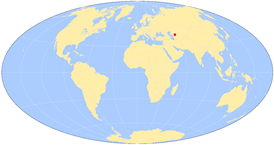
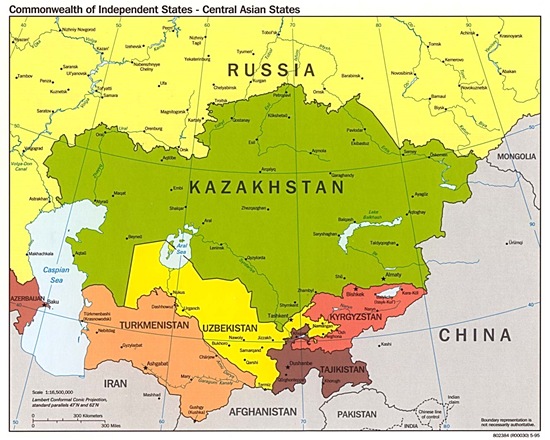
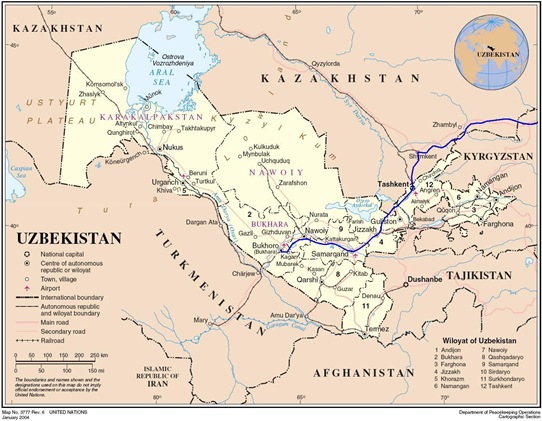
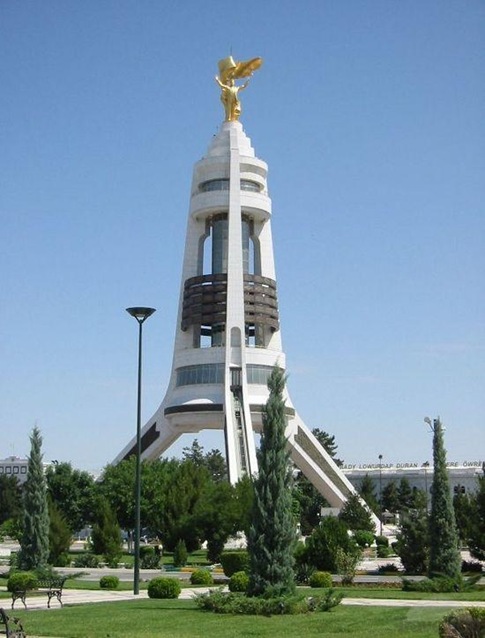
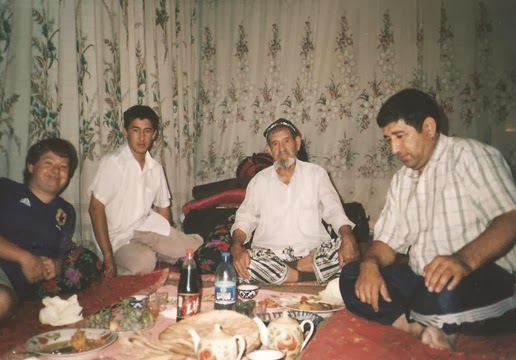
Thanks for the effective information. If you have any requirements for Taxi Services in India then you can book through our website.
ReplyDelete